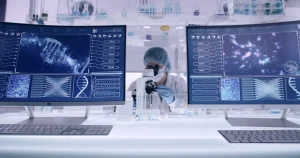In 2018, news of the birth of "genome-edited twins" in China shook not only the scientific community, but the international community at large. The incident highlighted the clash between innovation and ethics and sparked debate about the future use of gene editing. This article will delve into the details of the case, the ethical issues, the international reaction, and the implications for the future.
The Impact of the Genome Editing Twins Case and the Controversy That Followed

Case Summary: Birth of the world's first genome-edited twins
In 2018, a Chinese research team led by He Jiankui, PhD, used CRISPR-Cas9 technology to edit genes in human fertilized eggsDr. Kayo was the first to do so. Dr. Lulu and Nana, twin girls.Altered CCR5 geneSh,Strengthens immunity to the HIV virusThe announcement of this manipulation was immediately noticed around the world. This announcement quickly attracted worldwide attention and led to an international controversy that transcended the boundaries of science.
The possibilities offered by technology
Present,CRISPR-Cas9 Technologyoffers unprecedented possibilities for humanity. Not only can it significantly reduce the risk of serious diseases, but it is also theoretically possible to increase human physical capabilities beyond conventional limits. Furthermore, we can now look at enhancing intelligence and even optimizing genes related to life span. These possibilities truly suggest the realization of a human dream, but they also pose ethical and social challenges that we have not faced in the past.

Scientific Progress or Ethical Limits? Risks and Challenges of Genome Editing
Significance of Transgenerational Impacts
The effects of genetic modification of a fertilized egg do not end with a single generation. The changes are permanently passed on to offspring and may have irreversible effects on human genetic diversity. It is undeniable that genetic traits judged advantageous in today's environment may become fatal weaknesses in the future due to environmental changes. It is also possible that complex interactions between genes may lead to the emergence of new and unanticipated health risks. Of further concern is the possibility that the natural processes of human evolution will be disturbed, with unpredictable effects on our adaptive capacity as a species.
Emergence of a new social stratum
The development of genome editing technology suggests that economic disparities may be directly translated into genetic disparities. A so-called "genetic elite" class could be formed, with some people with access to expensive technology leaving behind genetically "optimized" offspring. This could further entrench and reinforce traditional social inequalities and cause serious divisions in human society. Such a situation could even shake the foundations of democracy.
Complex gene networks
Human genes do not function in isolation, but form a complex network. The phenomenon of multifaceted expression, in which a single gene affects multiple traits, and the mechanism of multifactorial inheritance, in which multiple genes cooperate to determine a single trait, make it extremely difficult to predict the effects of genetic modifications. Furthermore, these genes also interact with environmental factors, making the consequences even more complex.
Difficulty in predicting long-term impacts
Even with modern science and technology, it is impossible to completely predict the trans-generational effects of genetic modification. There are a myriad of factors to consider, including changes in selection pressure due to environmental changes such as climate change, interactions with the emergence of new pathogens, and the impact of a rapidly changing social environment on the degree of adaptation of individuals. These uncertainties demand even greater caution in the application of genome editing technologies.

Reaction of the International Community and Movement Toward Tighter Regulations
Reaction in China and Dr. Ga's Punishment
The Chinese government initially feigned irrelevance regarding the study,Amid growing worldwide criticism, Dr. Jiangyu Gah was arrested and his research was found to be illegal.Dr. Kaga was a member of the committee. Dr. Ga,Three-year prison sentenceand were strictly excluded from the scientific community. This incident led to stricter regulations on the use of gene editing technology in China.
International Reactions and Ethical Debates
The international scientific community has responded to the incident bysevere criticismand led governments to reconsider their guidelines for the use of gene-editing technologies.Stricter guidelines and regulations for gene editing of human embryos by many international organizations, including the World Health Organization (WHO) and the U.S. National Institutes of Health (NIH)and the debate about how gene editing should be used is in full swing.

The Future of Genome Editing: Harmonizing Science, Technology, and Ethics
Balance between regulation and technological progress
While this incident has led to calls for tighter international regulation of gene editing technologies, scientific and technological advances continue to be made...CRISPR technology...has been used in the development of a new type of gene editing technology, the CRISPR technology,cancer treatmentand ... andTreatment of Genetic Diseaseshas great potential and an increasing number of patients are benefiting from it. However,Balance between technological advances and social and ethical regulationsA major issue for the future is how to take the
Toward the appropriate use of technology to shape the future of humanity
While the development of gene editing technology is revolutionizing the future of medicine and agriculture, its use requires a very cautious approach. In particular,Effects of Manipulating Human Genetic Information on Societyand carefully consider how the technology should be used from an ethical standpoint.
Summary: The Impact of Genome Editing Technology on the Future and Our Choices
Genome Editing Twin Cases in 2018has tested the limits of science, but has also caused us to rethink the importance of ethics. While gene editing technology contributes to the advancement of medicine, the impact of its use on society is immeasurable. How science, technology, and ethics will be harmonized in the future, and how this technology will be used to build a sustainable and equitable future, will depend on the choices and actions of each and every one of us.
The future of gene editing has only just begun. But how its progress will affect humanity will be shaped by the discussions and responsible actions of all of us.
Reference links:.










